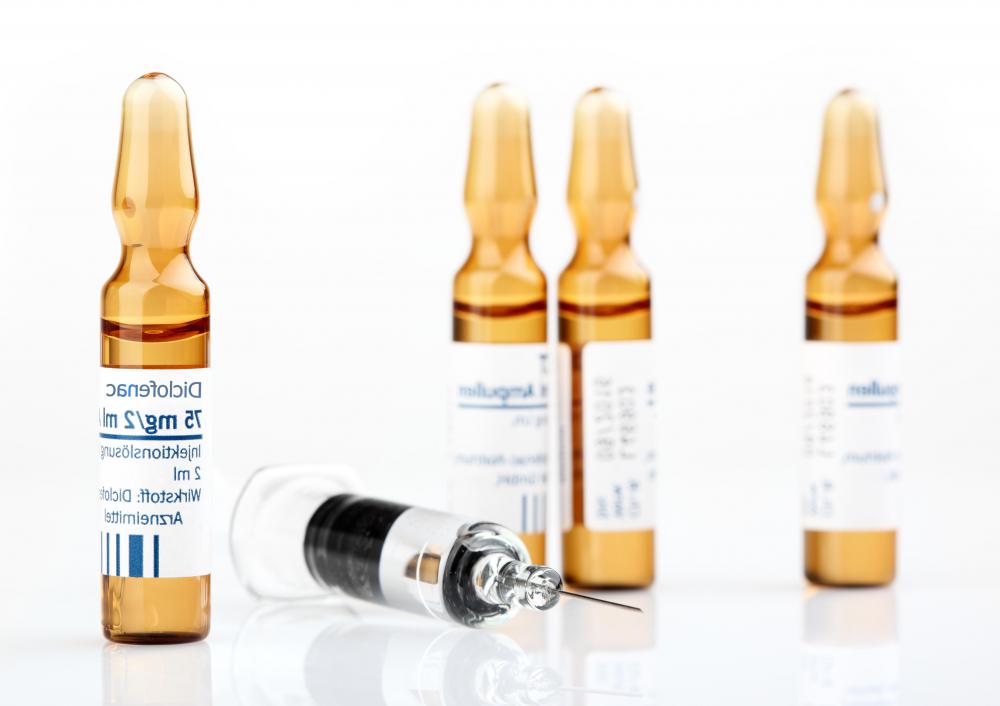At WiseGEEK, we're committed to delivering accurate, trustworthy information. Our expert-authored content is rigorously fact-checked and sourced from credible authorities. Discover how we uphold the highest standards in providing you with reliable knowledge.
How do I Choose the Best Treatment for Lupus?
There is no cure for lupus, so people who are afflicted by this disease primarily seek to manage their symptoms. Lupus is an inflammatory disease that causes the body's immune system to attack various tissues and organs in the body. The best treatment for lupus, therefore, depends on what symptoms are the most bothersome. The treatment must often be developed by the physician through trial and error, and even when a patient finds a treatment plan that is effective, they often have to modify it as their condition changes.
Many of the most common symptoms of lupus are the result of inflammation. In these cases, addressing the inflammation is the best treatment for lupus. Corticosteroids, like prednisone and cortisone, and nonsteroidal anti-inflammatories, such as naproxen and diclofenac are effective treatments for inflammation. Most sufferers of lupus will require some type of inflammation management.

Patients searching for a treatment for lupus symptoms involving joint pain and skin rashes may want to discuss anti-malarial medications with their doctor. These medications are often effective at treating both joint pain and skin conditions, as well as ulcerations that may develop inside the mouth and nose. Anti-malarial medications can also be effective at treating swelling around the heart and lungs, which can lead to chest pain.

Lupus suffers may experience what is known as a severe flare. This is when the illness becomes so aggressive that one or more organs of the body are in danger of permanent damage. Treatment for lupus during a severe flare often includes taking prescription immunosuppressant drugs. These drugs reduce the activity of the immune system, and while they do have side effects, they will help reduce damage to the organs.

If a patient is suffering from a particularly aggressive form of lupus, he or she may require a combination of corticosteroids in high doses, as well as immunosuppressant medication. The corticosteroids help bring the symptoms of lupus under control quickly, but do tend to have unpleasant side effects, including rapid weight gain. Immunosuppressive medications must be administered with caution, and are taken either by mouth, or intravenously. Side effects of immunosuppressants may be severe, and include an increased susceptibility to infections, long term risk of cancer, infertility, and damage to the liver. Doctors often administer the corticosteroids and immunosuppressants in a combined dose, so as to reduce the overall dosage, and therefore the likelihood of side effects, for each.
There are some lifestyle changes that a person suffering from lupus should consider. At least eight, and preferably ten hours, of sleep each night can help with the debilitating fatigue that is one symptom of lupus. Even if you get enough sleep, take breaks or naps during the day to rest. Sun exposure worsens the skin rashes associated with lupus. Mild exercise is a great way to deal with stress, and to improve your quality of sleep. Of course, anyone who smokes and is diagnosed with lupus should do everything possible to quit.
Finding an effective treatment for lupus is a balancing act, and requires experimentation. The best way to find an effective treatment is to work closely with your doctor, monitor symptoms, and note what works. No matter how frustrated and helpless the disease makes you feel, living a more healthful lifestyle and following your doctor's recommendations, should make it easier to keep the symptoms of lupus under control.
AS FEATURED ON:
AS FEATURED ON:













Discussion Comments
Lately, I see a lot of advertisements about natural treatments for lupus. I want to warn people about them because some of these remedies activate the immune system making lupus symptoms worse. I don't think that this is a good option.
@ysmina-- In my experience, the benefits of anti-malarial drugs for lupus definitely outweigh the risks. I've been taking an anti-malarial drug for a year now and it's definitely working for me. My rashes and inflammation have reduced. I have not had any negative side effects aside from some flatulence, which is no big deal.
If your doctor wants you on this type of drug, please follow his directions. There are not many treatments for lupus disease and anti-malarial drugs have been used for lupus symptoms for quite a while now. If it was harmful, doctors would not still be prescribing them. This group of drugs help slow down the response of the immune system and as you know, lupus is caused by our immune system attacking our own tissues.
Is anyone here on anti-malarial drugs for lupus treatment? My doctor wants me to go on an anti-malarial drug for my lupus symptoms but I've been resisting. I've heard that these drugs can have many side effects and I'm not sure that the advantages will be worth the risks for me.
Is anyone here on one? Is it working well for you? Are you experiencing negative side effects? I would love to hear about your experiences with these drugs.
Post your comments